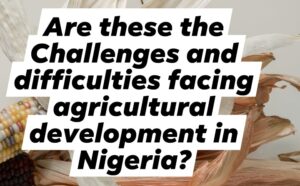Are this the Challenges and difficulties facing agricultural development in Nigeria?
The Importance of agriculture to Nigeria’s economy cannot be overlooked or overemphasized. The production of cash crops which serves as a great percentage of Nigeria’s source of income are strictly gotten through agriculture.
The government largely depends on agriculture in their desire to maintain food security across 36 states of the federation which further buttresses the importance of the sector to the overall welfare of the West Africa nation.
At least over 80 of populates in the country’s rural areas are farmers; hence it won’t be out of place to say that the sector serves as source of employment to many citizens of the nation. Judging by the above importance, you would expect the government to tackle every challenge and problem facing the sector but that hasn’t been the case thus far.
There are lots of challenges facing the development of agriculture in Nigeria that need urgent attention if the country must continue benefiting from the sector. In this article, we shall be revealing the top three problems facing agricultural development in Nigeria and how the government can provide long-lasting solutions to them.
Top Three Challenges Facing Agriculture In Nigeria And How To Solve Them
1. Shortage Of Land For Agricultural Purposes
Nigeria is blessed with great and fertile land mass but it’s quite unfortunate that most of the lands are not utilized for agricultural purposes, no thanks to the country’s ever-growing population.
Nigeria’s population continues to increase exponentially which means there is a need to build more houses on the available piece of land. Rural areas continue to develop steadily and people now desire to erect beautiful buildings on a piece of land that ought to have been used for farming or other agricultural practices.
In the same vein, erosion, natural disasters like earthquake, flood and desert encroachment are equally playing a great role in reducing the quantity of land suitable for agriculture purposes.
Long-term Solution To Shortage Of Land For Agriculture Purposes
The best way to solve this problem is for the government to make proper amendment to the laws governing the use of land in the country. Nigeria’s land use policy should be made in a way tha favors citizens who are financially buoyant to start and adequately run a commercial agriculture system.
The government should also ensure availability of farm inputs, such as manure, fertilizer, herbicides and insecticides, at the cheapest rate because that will encourage farmer’s desire to cultivate large portions of land for farming and other agricultural purposes.
2. Lack Of Financial Help
It is one thing to have the desire, land and strength to engage in large-scale agricultural practices, but it’s another thing to be financially buoyant to do so.
Many farmers are not wealthy enough to invest huge cash in their farm as they don’t have access to any credit facilities or fund-raising program. The government aren’t helping matters as they keep demanding high taxes from people who are already struggling to maintain their farm.
In the same vein, financial value of all mechanized agricultural tools and farm inputs continue to rise steadily across the country. This has successfully made many farmers, livestock owners and other agric-based personnel ignore their dreams of increasing their production scale.
Long-term Solution To the Financial Problem Facing Agriculture In Nigeria
There is no other way to solve this problem than having a government that is more than ready to give out accessible loans to farmers.
These loans shouldn’t include high interest rates, but should be accessible to both urban and rural based citizens. This will financially boost farmer’s desire to enlarge their agricultural production.
Agricultural banks, such as the Nigeria Agricultural and Co-operative Bank [NACB], should involve in some attractive loan programs so as to help all citizens who are involved in one or two agricultural practices.
Cooperative Society should be created by concerned individuals who are in need of financial help. This will go a long way in helping them secure loan from banks, federal or state government.
3. Lack of Mechanized or Sophisticated Farm Tools
As at the time of this report, at least 70% of Nigeria farmers are engaged subsistence production, no thanks to the huge reliance on crude or outdated agricultural implements.
Modern-day facilities are too expensive for many Nigerians to afford, hence they have no option but to cultivate the little they can do with their cutlasses and hoes. Tools like plough harrow, tractors, planters are known for their expensive price tags, thereby making them a no-go area to middle-class or low-income citizens.
In the same vein, many farmers can’t operate sophisticated equipment as they lack the required skills. This is one of the reasons why agriculture hasn’t enjoyed steady growth since the country’s independence 60 years ago.
Long-term Solution ToLack of Mechanized or Sophisticated Farm Tools
Firstly, workshop should be organized for farmers and other related citizens. They should be taught on how to make use of the modern-day farm implements for higher productivity.
There is a need to disburse many agricultural extension agencies to rural part of the country so that they can enlighten local-based farmers on how newly invented machines are being used for better effects .
The Government definitely need to support and boost the creation of Locally-made, but sophisticated, tools by offering financial support to local engineers makers. This will directly reduce the prices at which these tools are being sold to the public.
Lastly, the federal government should reach an agreement with all concerned parties or agencies so that all farm input are readily available to everyone at a very affordable price.